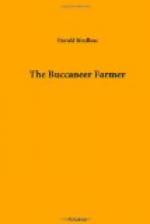Osborn’s face got red and he struggled for self-control. The fellow was his servant, but it looked as if he had cunningly involved him in entanglements an honest agent would have avoided. Osborn remembered that he had sometimes vaguely suspected Hayes. Now he knew him, it was too late.
“I may be forced to sell, but not to you,” he said haughtily.
Hayes shrugged. “That must be as you like, but I’m able to give you a better price than anybody else. I have an object for buying the farms and, if necessary, would pay something near their proper value, without taking off much for the debt. Anyhow, you had better look at this statement of your liabilities.”
Osborn studied the document with a hopeless feeling. Things were worse than he had feared and it cost him an effort to pull himself together when he looked up.
“Why do you want to buy?” he asked.
“Well, you see, the land between Forsyth’s and the dale-head is heavily mortgaged, and, taking the two farms with the others, would make a compact block that could be economically worked. The new estate would run down to Tarnside, and since you may find it needful to sell the house, I might make you an offer.”
“But the consolidation wouldn’t help you,” Osborn remarked with a puzzled look. “It would, perhaps, be an advantage for the mortgage holders.”
“I hold the mortgages,” Hayes said quietly.
Osborn started. “But,” he stammered, “I got the money from somebody else.”
“That is so. I bought the other debts, and supplied the funds when you raised new loans.”
“You bought the debts with my money!” Osborn exclaimed. “You used your post to rob me of my estate!”
“I suppose one must make allowances, but you are unjust. You got the proper value for the land you pawned, and squandered the money. The consequence was inevitable and it’s futile to complain. For that matter, it is not altogether unusual for a landlord and his steward to change places.”
“I trusted you and you cheated me,” Osborn resumed with poignant bitterness.
“You lived in false security and refused to think. You knew the reckoning must come, but were satisfied if you could put it off. Now you must bear the consequences, it is not my fault. However, this is not important. Will you sell?”
“No,” said Osborn hoarsely. “I will not sell to you.”
Hayes smiled. “You must sell to somebody and will not get as good a price.”
Osborn got up and went out with a dragging step. The blow had left him numb, but as he drove home in the rain he had a hazy notion that Hayes’ statements were to some extent justified. He had lived in false security; seeing how things were going and yet refusing to believe. Somehow, it had looked impossible for him to lose Tarnside. The estate was his by the sacred right of inheritance; for a hundred years there had been an Osborn at the Hall. Yet the estate had gone, and he was to blame. It had, so to speak, melted in his careless hands. He felt old and broken when he told his wife and daughter about the interview.




